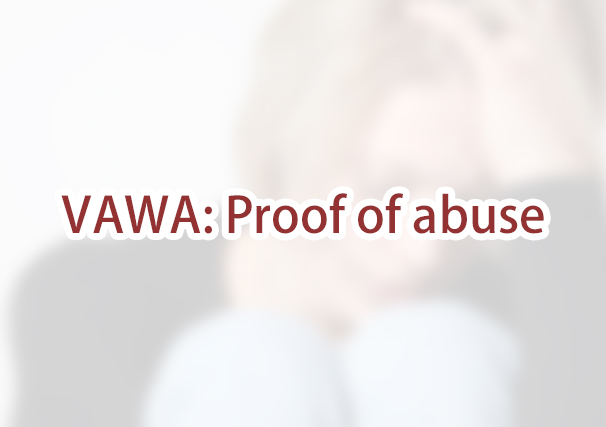
Question: To apply for a green card under the Violence Against Women Act (“VAWA”), how do I prove I was abused?
Answer: To receive a green card through VAWA, you must provide evidence that demonstrates you are a victim of battery or extreme cruelty by a family member. According to the U.S. Citizenship and Immigration Services (“USCIS”), a VAWA self-petitioner may submit “any relevant credible evidence” of such abuse.
What is battery or extreme cruelty?
To prove you are eligible for a green card through VAWA, you must submit evidence that you are a victim of battery or extreme cruelty committed by an applicable family member. The phrase “battery or extreme cruelty” covers most forms of domestic abuse, including
- Actual or threatened physical abuse;
- Psychological or emotional abuse;
- Threats, verbal abuse, stalking, isolation;
- Economic control; and
- Any pattern of coercive behavior that is used to gain power and control over the victim.
Proving abuse under VAWA
To prove abuse under VAWA, you may submit any relevant evidence that you are a victim of battery or extreme cruelty. The credibility of the evidence you submit and the weight afforded to such evidence is within the sole discretion of USCIS. Examples of evidence of abuse include:
- Court records about your abuser’s criminal case or your attempts to obtain an order of protection;
- Police reports about the abuse you suffered;
- Medical records about the abuse you suffered;
- Your personal statement describing the abuse you suffered;
- Affidavits from persons with knowledge of the abuse you suffered, including friends, family members, coworkers, and mental health counselors;
- Emails, text messages, and other communications from the abuser;
- Photographs;
- A record that you have seen a psychologist;
- Records of visits to a domestic shelter; and
- Any other credible evidence that can prove the abuse.
Obviously, court records and police reports are extremely helpful to your application. This evidence is much more credible than simply providing your own statement. If you are the victim of abuse, you should report the abuse to the police and take all steps necessary to protect your safety, including seeking an order of protection and obtaining medical care. You should keep as many documents as possible.
Often, the applicant will not have court records, police reports, or medical records. This is especially true if the abuse is not physical and is instead psychological or emotional. In this scenario, your personal statement and written statements of any corroborating witnesses are extremely important. Such statements should provide as much detail as possible to convince USCIS of the existence of the abuse.

ImmiFree.Law is The Harrison Law Firm P.C.’s online platform to make the family immigration and naturalization process more efficient, accurate, and affordable. Baya Harrison, Esq. is an attorney licensed in New York, Florida, and California. Attorney Harrison has helped numerous individuals and families navigate the U.S. immigration process, specifically family-based petitions and naturalization.